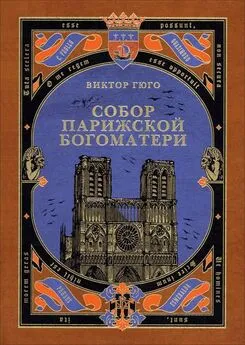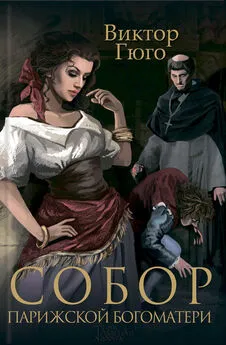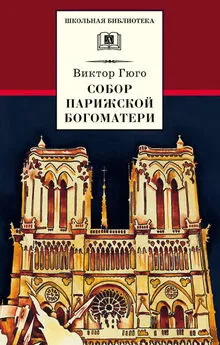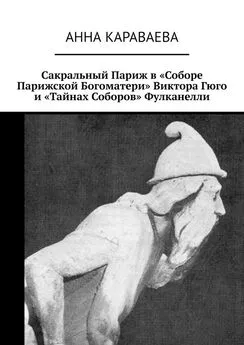Виктор Мари Гюго - Собор Парижской богоматери / Notre-Dame de Paris
- Название:Собор Парижской богоматери / Notre-Dame de Paris
- Автор:
- Жанр:
- Издательство:неизвестно
- Год:2020
- Город:Москва
- ISBN:978-5-17-117792-8
- Рейтинг:
- Избранное:Добавить в избранное
-
Отзывы:
-
Ваша оценка:
Виктор Мари Гюго - Собор Парижской богоматери / Notre-Dame de Paris краткое содержание
Собор Парижской богоматери / Notre-Dame de Paris - читать онлайн бесплатно ознакомительный отрывок
Интервал:
Закладка:
“Monsieur,” he said, turning towards one of his neighbors, a fine, big man, with a patient face, “suppose we begin again.”
“What?” said his neighbor.
“The Mystery,” said Gringoire.
“As you like,” returned his neighbor.
This sufficed for Gringoire, and he began to shout: “Begin the mystery again! Begin again!”
The bailiff approached the cardinal, and awkwardly explained to him that noonday had arrived before his eminence, and that the comedians had been forced to begin without waiting for his eminence.
The cardinal burst into a laugh.
“Monseigneur,” said Guillaume Rym, “let us be content with having escaped half of the comedy. There is at least that much gained.”
“Can these rascals continue their farce?” asked the bailiff.
“Continue, continue,” said the cardinal, “it’s all the same to me.”
The personages on the stage took up their parts, and Gringoire hoped that the rest of his work, at least, would be listened to. This hope soon faded; silence had indeed, been restored; but Gringoire did not realise that at the moment, the gallery was far from full, and that the important personages were still being announced.
“Master Jacques Charmolue, procurator to the king in the Ecclesiastical Courts!”
“Messire Galiot de Genoilhac, chevalier, seigneur de Brussac, master of the king’s artillery!”
“Master Denis le Mercier, guardian of the house of the blind at Paris!” etc., etc., etc.
This was becoming unbearable.
And still, nothing could turn the audience from the cardinal; all eyes remained fixed there. No one listened, no one looked at the poor, deserted morality. Gringoire saw only profiles.
The usher’s brutal monologue came to an end; every one had arrived, and Gringoire breathed freely once more; the actors continued bravely. But Master Coppenole, all of a sudden rose and proclaimed:
“Messieurs and squires of Paris, I don’t know, what we are doing here. I don’t know whether that is what you call a “mystery,” but it is not amusing; they quarrel with their tongues and nothing more. That is not what I was told; I was promised a feast of fools, with the election of a pope. The way we manage it in Ghent is; we collect a crowd like this one here, then each person in turn puts his head through a hole, and makes a grimace; the one who makes the ugliest, is elected pope by general acclamation. What say you, Messieurs les bourgeois ?”
Gringoire would have liked to retort; stupefaction, rage, indignation, deprived him of words. Moreover, the suggestion of the popular hosier was received with such enthusiasm, that all resistance was useless. There was nothing to be done but to allow one’s self to drift with the torrent.
Chapter V
Quasimodo
In the twinkling of an eye, all was ready to execute Coppenole’s idea. Everyone set to work. The little chapel situated opposite the marble table was selected for the scene of the grinning match. A pane broken in the pretty rose window above the door, left free a circle of stone. That was agreed upon as the hole that the competitors should thrust their heads in. In order to reach it, it was only necessary to mount upon a couple of hogsheads. It was settled so that each candidate should cover his face and remain concealed in the chapel until the moment of his appearance. In less than an instant, the chapel was crowded with competitors.
Coppenole directed all. During the uproar, the cardinal had retired to his suite, under the pretext of business.
The grimaces began. A second and third grimace followed, then another and another; and the laughter went on increasing.
“Just look at that face!”
“It’s not good for anything.”
“Another!”
“Good! Good!”
As for Gringoire, it was far worse than it had been a little while before. He no longer beheld anything but backs.
There was a thunder of applause. The Pope of the Fools had been elected.
“ Noël! Noël! Noël! [2] Французский эквивалент “Hurrah”.
” shouted the people on all sides. A marvellous grimace was beaming at that moment through the aperture in the rose window. It had a tetrahedral nose, a horseshoe mouth; one little left eye obstructed with a red, bushy, bristling eyebrow, while the right eye disappearing entirely beneath an enormous wart. Teeth were in disarray, broken here and there. The whole expression was a mixture of malice, amazement, and sadness.
People rushed towards the chapel. They made the lucky Pope of the Fools come forth in triumph. But it was then that surprise and admiration attained their highest pitch; the grimace was his face.
Or rather, his whole person was a grimace. A huge head, bristling with red hair; between his shoulders was an enormous hump; crooked legs; large feet, monstrous hands; and, with all this deformity, an indescribable air of agility and courage.
When he appeared on the threshold of the chapel, the people recognized him on the instant, and shouted with one voice,—
“’Tis Quasimodo, the bellringer! ’tis Quasimodo, the hunchback of Notre-Dame! Quasimodo, the one-eyed!”
“Oh! the horrible monkey!” said one of the women.
“As wicked as he is ugly,” retorted another.
“He’s the devil,” added a third.
The men, on the contrary [3] on the contrary – наоборот
, were delighted.
Master Coppenole, in amazement, approached him.
“Cross of God! Holy Father! you possess the handsomest ugliness that I have ever beheld in my life. You would deserve to be pope at Rome, as well as at Paris.”
So saying, he placed his hand gayly on his shoulder. Quasimodo did not stir. Coppenole went on,—
“You are a rogue with whom I have a fancy for carousing, were it to cost me a new dozen of twelve livres of Tours. What do you say?”
Quasimodo made no reply.
“Are you deaf?”
He was, in truth, deaf.
“Deaf!” said the hosier, with his great Flemish laugh. “Cross of God! He’s a perfect pope!”
“Ha! I recognize him,” exclaimed Jehan, “he’s the bellringer of my brother, the archdeacon. Good-day, Quasimodo!”
“He speaks when he chooses,” said the old woman; “he became deaf through ringing the bells. He is not dumb.”
Everyone koined together to seek the cardboard tiara and the derisive robe of the Pope of the Fools. Quasimodo allowed them to array him in them. Then they made him seat himself on a plank. Twelve people raised him on their shoulders; then the procession set out on its march around the inner galleries of the Courts, before making the circuit of the streets and squares.
Chapter VI
Esmeralda
Gringoire and his piece had stood firm. His actors, continued to spout his comedy, and he continued to listen to it.
To tell the truth, a few spectators still remained.
“Well,” thought Gringoire, “here are still as many as are required to hear the end of my mystery. They are few in number, but it is a choice audience.”
“Comrades,” suddenly shouted one of the kids from the window, “La Esmeralda! La Esmeralda in the Place!”
This word produced a magical effect. Every one who was left in the hall flew to the windows, repeating, “La Esmeralda! La Esmeralda?”
“What’s the meaning of this, of the Esmeralda?” said Gringoire. “Ah, good heavens! it seems to be the turn of the windows now.”
He returned towards the marble table, and saw that the representation had been interrupted. Jupiter should have appeared with his thunder. But Jupiter was standing motionless at the foot of the stage.
“Michel Giborne!” cried the irritated poet, “what are you doing there? Is that your part? Come up!”
“Alas!” said Jupiter, “a scholar has just seized the ladder.”
Gringoire looked. It was but too true.
“And why did he take that ladder?”
“In order to go and see the Esmeralda,” replied Jupiter. “He said, ‘Come, here’s a ladder that’s of no use!’ and he took it.”
This was the last blow.
“May the devil fly away with you!” he said to the comedian, “and if I get my pay, you shall receive yours.”
As he descended the winding stairs of the courts. he muttered: “These Parisians! They come to hear a mystery and don’t listen to it at all! And I! To come only to see faces and behold backs! May the devil flay me if I understand what they mean with their Esmeralda! What is that word, in the first place?”
Book Second
Chapter I
From Charybdis to Scylla
Night comes on early in January. The streets were already dark when Gringoire left the Courts. This gloom pleased him. After the brilliant failure of his first theatrical venture, he dared not return to the place he lived in, as he owned twelve sols for the rent. He remembered to seeing in the Rue de la Savaterie, at the door of a councillor of the parliament, a stepping stone for mounting a mule, which could serve as a very excellent pillow for a mendicant or a poet. He thanked Providence for having sent this happy idea to him; but then he saw the procession of the Pope of the Fools, which was also emerging from the court house. He fled.
Children were running about here and there with fire lances and rockets.
A street opened before him; he thought it so dark and deserted that he hoped to escape from all the rumors as well as from all the gleams of the festival. He reached the western point of the city and considered for some time the islet of the Passeur-aux-Vaches. The islet appeared to him in the shadow like a black mass. One could see by the ray of a tiny light a hut in the form of a beehive where the ferryman of cows took refuge at night.
“Happy ferryman!” thought Gringoire; “you do not dream of glory, and you do not make marriage songs! What matters it to you, if kings and Duchesses of Burgundy marry? Thanks, ferryman, your cabin rests my eyes, and makes me forget Paris!”
He was roused from his thoughts by the sounds of the cow ferryman taking his part in the rejoicings of the day and letting off fireworks.
“Accursed festival!” exclaimed Gringoire, “will it pursue me everywhere?”
Then he looked at the Seine at his feet, and a horrible temptation took possession of him:
“Oh!” said he, “I would gladly drown myself, were the water not so cold!”
Chapter II
The Place de Grève
Place de Grève was bordered on one side by the quay, and on the other three by a series of narrow and gloomy houses. By day, one could admire the variety of its edifices, all sculptured in stone or wood, presenting complete specimens of the different domestic architectures of the Middle Ages, running back from the fifteenth to the eleventh century. At night, one could distinguish nothing of all that mass of buildings, except the black indentation of the roofs, unrolling their chain of acute angles round the place.
When Pierre Gringoire arrived on the Place de Grève, he was paralyzed. He had directed his course across the Pont aux Meuniers, in order to avoid the crowd; but the wheels of all the bishop’s mills had splashed him as he passed, and he was drenched. Hence he went to draw near the bonfire, which was burning magnificently in the middle of the Place. But a considerable crowd formed a circle around it.
“Accursed Parisians!” he said to imself, “there they are obstructing my fire! Nevertheless, I am greatly in need of warmth. Move aside! I’d like to know what they are doing there!”
Читать дальшеИнтервал:
Закладка:






![Виктор Гюго - Собор Парижской Богоматери. Париж [сборник]](/books/1068816/viktor-gyugo-sobor-parizhskoj-bogomateri-parizh-sbo.webp)



